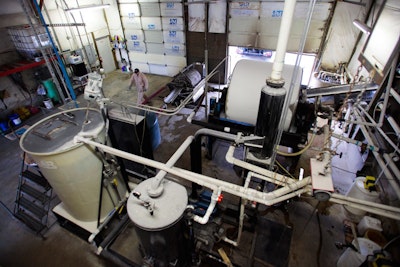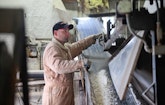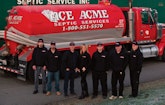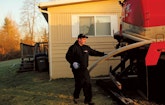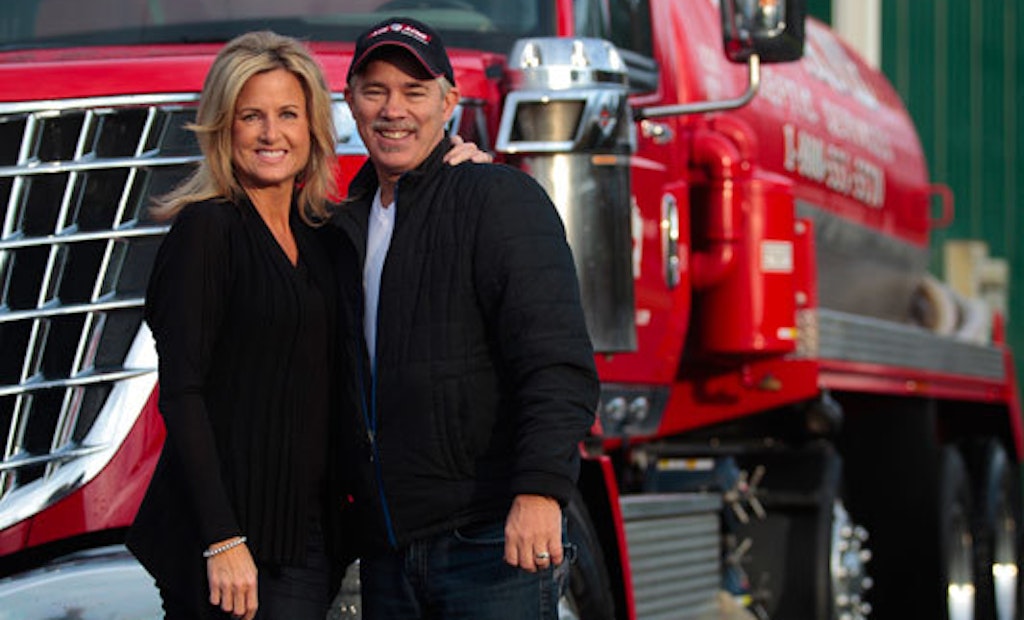
Interested in Dewatering?
Get Dewatering articles, news and videos right in your inbox! Sign up now.
Dewatering + Get AlertsEven the high-tech world around Seattle felt the recession several years ago. Businesses flying above the clouds fell to earth. But Ace Acme Septic Services didn’t experience that. It kept serving customers in the counties and communities north of the city, and this family-owned company is still around after 62 years – and it was featured about 20 years ago in Pumper –because of its business mix and a polished focus on what it can do best for customers.
SEPTIC OVER SEWER
Ace Acme covers four counties in western Washington along Puget Sound. The company’s home is the city of Arlington in Snohomish County, which lies north of Seattle and contains some smaller cities of the Seattle metro area as well as aircraft assembly plants for the Boeing Co.
The description makes the county sound urban, but it’s not. Probably 90 percent of Snohomish County is on septic, and most of the company’s revenue comes from the county, says Todd Summers, who runs the family corporation with his wife Kelly.
In addition to Snohomish, the company covers part of King County, where Seattle is, Skagit County to the north of Snohomish, and Island County, which is comprised of some large islands just off the coast in Puget Sound.
The growth rate is not what it was. For a few years, Snohomish County was the fastest growing county in the nation, but even if its growth is no longer feverish, from 2010 to 2012 it was still a respectable 2.8 percent. Yet that growth is not reflected in the extension of big pipes from municipal wastewater systems.
“Each year there are more people going on septic than there are sewer,” Todd says. “If they’re within 10 miles of some city’s border, it will take more than 10 years until a municipal system reaches them.”
It comes down to the cost of big pipes. No longer are municipal sewer extensions subsidized by governments or developers. Landowners face the full cost, and it is not a pleasant sight. “People will call me all the time because they checked on the cost to hook up to sewer, and it’s [$40,000]. And that doesn’t include the cost to run a lateral from the home to the main,” Todd says.
STICK TO PUMPING
That may look like an opening for a profitable installation business, but Ace Acme doesn’t do much of this work. The company doesn’t carry a lot of manpower for such jobs, nor has it invested in large equipment. Todd says he finds it more profitable to do repairs and pumping.
For about 20 years Ace Acme also had a portable restroom operation, but that was recently sold. It was tough to manage, and their area had a lot of competition, Todd says. “We decided to focus on our core septic service where most of our business and income comes from,” Kelly says.
Ace Acme’s focus also fits its area. Advanced technology wastewater systems comprise perhaps 10 percent of the units Ace Acme deals with, and most of those are on the edges of waterways. Company technicians work primarily on systems installed from the 1960s to the 1990s. Technicians also deal with a problem typical in areas where people move out from cities: Customers have no idea how to care for a septic system or even how it works.
“People come into subdivisions and put anything down the drain. All the advanced systems with UV lights, sensors and pumps, they can’t handle what’s going into them, and it’s just a matter of time until they choke up,” Todd says.
THE DEWATERING DIFFERENCE
An important step for the company was the installation of an Alar Engineering Corp. dewatering system 22 years ago, about the time the company was first profiled in Pumper. The system sits in a 60- by 40-foot space, and helps considerably to keep down discharge fees and fuel costs. Ace Acme dewaters between 8,000 and 10,000 gallons per day. Water from the Alar machine goes into a city sewer. That was a consideration when the company built its headquarters. The city pipe is just 15 feet from the Ace Acme building.
The Alar system is simple. To each batch of septage a technician adds diatomaceous earth, which acts as a filtering medium. The resulting slurry is emptied into a large tub. Rotating in the tub is a large drum whose inside is under vacuum. The vacuum pulls the slurry against the outer side of the drum and draws water through the diatomaceous earth. From inside the drum the filtered water is sent out through the hollow drum shaft, through a meter, and into the sewer. Solids accumulating on the outside of the drum are scraped off by a knife, and the dry cake is sent to eastern Washington for land spreading as fertilizer.
Dewatering reduces the per-gallon cost of disposal considerably, Todd says. He can do that for about 5 cents a gallon. The other less expensive option for pumpers is a private disposal facility about 15 miles away. With the cost of fuel and labor figured in, Ace Acme’s competitors are paying about 13 cents per gallon. By comparison, the cost of discharging septage into the municipal plant in the city of Everett was 7.25 cents per gallon when Todd started in the business. Everett is now charging 25 cents per gallon. Local pumpers don’t go there.
Area wastewater plants are also tightening standards, Todd says. There are three dumping stations within 50 miles, but population growth has strained them. Plants reject loads on some days to restrict the volume of waste brought to them, and in the last five years restrictions have become tighter.
Todd has thought about installing a newer dewatering machine. So many industrial technologies have improved in 22 years, yet Todd doesn’t think that’s necessarily the case with dewatering equipment. Controls may be more sophisticated, but the machines are much the same and work in the same way, he says. Expanding the operation may justify a newer piece of equipment, but not continuing as is.
ENCOURAGING LOYALTY
Ace Acme picked up some customers when other companies went out of business, but what Todd and Kelly Summers really want to do is keep customers.
“Most of them are pretty loyal, and there is a difference between doing installations and doing what we do,” Todd says. “The installation business here is pretty competitive. But once we have a septic customer, we become the people they call for repairs.”
“Our philosophy, and what we like to instill in employees, is to treat customers as if their property is our property, and to treat customers as we want to be treated. We want to be friendly. We’re there for service and to educate homeowners about their systems,” Kelly says.
Keeping the trucks clean is an obvious step in presenting a professional appearance, but if you look at Ace Acme trucks there is one thing you won’t see: a selection of phone numbers covering the company’s large service area. Instead there is just one number, a toll-free one that works only within the state of Washington.
To signal customers that they’re calling a local business the company has local numbers in area phone books. But given the size and population of their service area, listing all area phone numbers on a truck would be too confusing, Todd says. The single toll-free number can be spotted with a glance and gives people only one thing to remember.
A LONG HISTORY
Ace Acme was founded in 1952 by a family friend. Todd’s uncle later bought the business, and Todd’s parents bought it from his uncle around 1974. It was very much a family operation for years. Todd’s brother worked for their dad, Troy. One man was on the truck, the other answered phones, and the business was run from a home office.
Todd started in the business about 1983. They hired another man, and for a time it was Todd and the hired hand on the trucks. Then Todd was offered the chance to come into the office because his dad wanted to retire. That was 25 years ago.
The company is still family owned, but it’s a family corporation. Troy remains the president but over the years has withdrawn from daily duties.
IN THE GARAGE
Ace Acme runs on a variety of equipment. The company has three service vans, all Ford F-350s.
There are three vacuum trucks. The newest is a 2013 International with a 4,000-gallon tank. Also in the fleet are a 2004 Peterbilt with a 3,250-gallon tank, and a 2006 Kenworth with a 3,250-gallon tank. All the tanks are steel and all the pumps are from Masport. Erickson Tank & Pump built them out.
The service vans may carry a SeeSnake camera from RIDGID, one of the company’s Honda jetters, or pull a trailer with one of the two trackhoes, one from Kubota and the other from Takeuchi.
FUTURE LOOKS SUNNY
As Todd and Kelly Summers look to the future of Ace Acme, one possibility they see is expanding their dewatering operation by accepting waste from other haulers. That would provide additional revenue but not require more people, Kelly says.
Yet it also depends on the city of Arlington. The municipality invested about $2 million in its wastewater plant a few years ago, and the area is still growing. At one point there was a moratorium on new sewer connections while the city looked at its needs, Todd says. The question is how much more water the city plant can handle. Ace Acme is probably near its discharge limit given the present system and would have to base its expansion plans on future upgrades to the Arlington system.
Even without additional dewatering, the future looks good. The company has grown considerably from where it was when Todd joined, and he and Kelly are very comfortable with the amount and quality of the service they provide. Unlike the Seattle weather, there are no clouds on this horizon.
MORE INFORMATION
Alar Engineering Corp. - 708/479-6100 - www.alarcorp.com
Erickson Tank & Equipment Group - 509/785-2955 - www.ericksontank.com
Honda Power Equipment Group - 678/339-2600 - www.powerequipment.honda.com
Masport, Inc. - 800/228-4510 - www.masportpump.com
RIDGID - 800/769-7743 - www.ridgid.com
